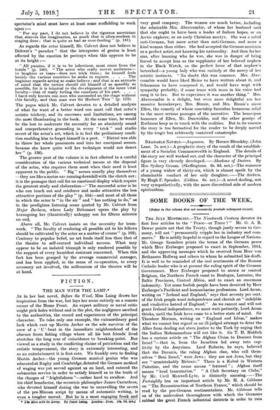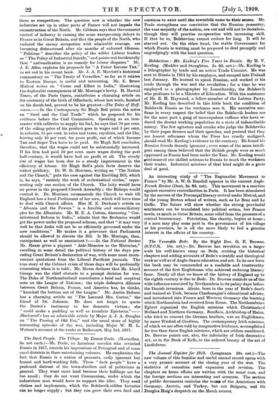SOME BOOKS OF THE WEEK.
[Notice in this column does not necessarily preclude subsequent review].
THE JULY MommiES.—The Nineteenth Century devotes its first four articles to the "Peace—or Truce ? " Mr. G. A. B. Dewar points out that the Treaty, though justly severe to Germany, will not "permanently cripple her in industry and commerce." He is mildly hopeful in regard to the League of Nations. Mr. George Saunders prints the terms of the German peace which Herr Erzberger proposed to exact in September, 1914, and the approving messages which he received from Herr von Bethmann Hollvreg and others to whom he submitted his draft. It is well to be reminded of the real sentiments of the Roman Catholic leader who is at present the ruling spirit of the German Government. Herr Erzberger proposed to annex or control Belgium, the Northern French coast to Boulogne, Lorraine, the Baltic Provinces, Central Africa, and to exact an enormous indemnity. Yet some foolish people have been deceived by Herr Erzberger's Pacificist and humanitarian professions. Lord Arran, writing on "Ireland and England," says that seventy per cent. of the Irish people want independence and cherish an "indelible and vindictive hatred of England." As we cannot and will not grant Ireland independence, we must wait patiently, Lord Arran thinks, until the Irish have come to a better state of mind. Sir Theodore Morison, writing on "England and Islam," makes what we cannot but regard as an ill-judged attempt to deter the Allies from dealing out stern justice to the Turk by urging that the Indian 'Mohammedans will not like it. Sir T. H. Holdich has a curious article on "The Afghan Claim to Descent from Israel "—that is, from the Israelites led away into captivity by the Assyrians. Lord Roberts, he says, believed that the Duranis, the ruling Afghan clan, who call themselves "Beni Israel," were Jews ; they are not Jews, but they are "unmistakably Hebraic." There is a Kabul in Western Palestine, and the name means " fettered " ; Afghan itself means "loud lamentation." "A Club Secretary on Clubs," by Mr. Cecil Maxwell-Lyte, is distinctly amusing.—The Fortnightly has an important article by Mr. H. A. Gibbons on "The Reconstruction of Northern France," which should be read by the pro-German sentimentalists. Mr. Gibbons tells us of the malevolent thoroughness with which the Germans robbed the great French industrial districts in order to ruin them as competitors. The question now is -whether the new industries set up in other parts of Francewill not impede the reconstruction of the North. Mr. Gibbons says that Government control of industry is causing the same exasperating delays in France asin Great Britain, and that the people of the North, who endured the enemy occupation with admirable courage, are becoming disheartened after six months of enforced idleness. " Politiou.s " describes the policy of the wilder Labour leaders as " The Policy of Industrial Suicide," and points out incidentally that "nationalization is no remedy for labour disputes." Mr. J. E. Allen explains his proposals for A Fairer Income Tax," as set out in his recent book. Mr. J. A. R. Marriott's historical commentary on "The Treaty of Versailles," so far as it relates to Eastern Europe, is useful and interesting. Mr. E. Bruce Mitford writes on "Cause and Effect in India," illustrating the deplorable consequences of Mr. Montagu's levity. M. Martial Teneo, of the Paris Opera, contributes a charming article on the centenary of the birth of Offenbach, whose last work, finished on his death-bed, proved to be his greatest—The Tales of Hoffmann.—In the Contemporary Sir Hugh Bell prints the notes on "Steel and the Coal Trade" which he prepared for his evidence before the Coal Commission. Speaking as an ironmaster with collieries to supply his fuel, he says that 70 per cent. of the selling-price of his product goes in wages and 5 per cent. in salaries, 15 per cent. in rates and taxes, royalties, and the like, leaving only 10 per cent. for gross profit, out of which Income Tax and Super Tax have to be paid. Sir Hugh Bell concludes, therefore, that the wages could not be substantially increased. If his firm had paid 10 per cent, more wages during the past half-century, it would have had no profit at all. The steady rise of wages has been due to a steady improvement in the efficiency of labour. Sir Hugh Bell's plain facts deserve the widest publicity. Dr. W. D. Morrison, writing on "The Nation and the Church," puts the case against the Enabling Bill, which is, he says, "entirely the work of ecclesiastical circles," representing only one section of the Church. The laity would have no power in the proposed Church Assembly ; the Bishops would control it. Dr. Morrison recommends the Church to wait till England has a local Parliament of her own, which will have time to deal with Church affairs. Miss M. E. Durham's article on "Albania and the Powers" is a forcible and unconciliatory plea for the Albanians. Mr. 11. E. A. Cotton, discussing "Constitutional Reform in India," admits that the Brahmins would get the power under the proposed scheme, and that "it may very well be that India will not be so efficiently governed under the new conditions." He makes it a grievance that Parliament should be allowed to discuss the Bill. Is Mr. Montagu, then, omnipotent as well as omniscient ?--In the National Review Mr. Masse gives a piquant "Aide-Memoirs to the Historian," recalling in some detail the political history of the days preceding Great Britain's declaration of war, with some most inconvenient quotations from the Liberal Pacificist journals. The true story of the Cabinet crisis of those days will be profoundly interesting when it is told ; Mr. Maxse declares that Mr. Lloyd George was the chief obstacle to a prompt decision for war. The Duke of Northumberland contributes a brief and sceptical note on the League of Nations; the triple defensive Alliance between Great Britain, France, and America has, he thinks, "knocked the bottom out of the League." Mr. Austin Dobson has a charming article on "The Learned Mrs. Carter," the friend of Dr. Johnson. He does not forget to quote the Doctor's testimony to her domestic virtues ; she "could make a pudding as well as translate Epiotetus." Blackwood's has an admirable article by Major A. J. A. Douglas on "The Passing of Old Fez," and the usual store of highly interesting episodes of the war, including Major W. H. L. Watson's account of the tanks at Bullecourt, May 3rd, 1917.
The Dark People. The Village. By Ernest Poole. (Macmillan. 6s. net each.)—Mr. Poole, an American novelist who revisited Russia in 1917, records his impressions of Petrograd and of some rural districts in these entertaining volumes. He emphasizes the fact that Russia is a nation of peasants, sadly ignorant but honest and hard-working folk. These "dark people" have a profound distrust of the town-dwellers and of politicians in general. They want more land because their holdings are far too small ; they do not want Communism, under which the industrious man would have to support the idler. They need clothes and implements, which the Bolshevik-ridden factories can no longer supply ; but they can. grow their own food and
continue-to exist until, the towniffialk coma to their senses. Mr. Poole strengthens our conviction that the Russian peasantry,
the majority of the nation, are :not anctviill not-be Socialists, though they will practise cceoperation with increasing skill. If that be so, ' Bolshevism cannot endure for long. It will be starved out. On the other hand, the stable Government ' for which Russia is waiting must be prepared to deal promptly and ungrudgingly with the land question.
Bolshevism : Mr. Keeling's Five Years in Russia. By H. V. Keeling. (Hodder and Stoughton. 2s. 6d. net.)—Mr. Keeling is a lithographer by trade and an active Trade Unionist. He was sent to Russia in 1914 by his employer, and escaped into Finland last January. He learned to speak Russian, and worked at his trade through the war and the revolution ; for a time he was employed as a photographer by Lunacharsky, the Bolshevik who professes to be a Minister of Education. With the assistance of Mr. E. H. Haywood, a fellow-member of the Labour Party, Mr. Keeling has described in this little book the condition of Bolshevik Russia as the workman sees it. His narrative confirms in every respect the belief that the Bolshevik leaders are for the most part a gang of unscrupulous ruffians who have reduced the decent working population to a state of indescribable misery. The few agitators and cranks who judge the Bolsheviks by their paper decrees and their speeches, and pretend that they are honest reformers whom the Press has cruelly maligned, should read Mr. Keeling's evidence to the contrary. He found his Russian friends densely ignorant ; even some of the more intelligent among them believed that the British people were as much oppressed as Russia had been under the Tsar. Mr. Keeling would Bend some of our skilled artisans to Russia to teach the workmen their trades. Industrial missions of that kind might do a great deal of good.
An interesting study of "The Regionalist Movement in France" by Mr. A. W. G. Randall appears in the current AngloFrench Review (Dent, 2s. 6d. net). This movement is a reaction against excessive centralization in Paris. It has been stimulated by the success of the Provençal literary revival under Mistral, and of the young Bretonschool of writers, such as In Braz and In Goffie. The future will show whether the strong provincial sentiments can be translated into political action, but France needs, as much as Great Britain, some relief from the pressure of a central bureaucracy. Patriotism, like charity, begins at home ; if a man may play some part in the government of his village or his province, he is all the more likely to feel a genuine interest in the affairs of his country.
The Venerable Bede. By the Right Rev. G. F. Browne. (S.P.C.K. 10s. net.)—Dr. Browne has rewritten on a larger scale his well-known essay on Bede, revising the historical chapters and adding accounts of Bede's scientific and theological work as arell as of Anglo-Saxon education and art. In its new form the book may be commended as a readable and trustworthy account of the first Englishman who achieved enduring literary fame. Nearly all that we know of the history of England up to the eighth century is duo to Bede. Dr. Browne reminds us of the wide influence exercised by Northumbria in its palmy days before the Danish invasions. Alcuin, born in the year of Bede's death and trained at York, became Charlemagne's educational adviser, and introduced into France and Western Germany the learning which Northumbria had received from Rome. The Northumbrian Egbert organized the English missions -which Christianized Holland and Northern Germany. Bordface, Archbishop of Mainz, who tried to convert the German heathen, was an Englishman, by name Winfrid of Crediton. The contemporary Irish missions, of which we are often told by imaginative Irishmen, accomplished far less than these English missions, which are seldom mentioned. Dr. Browne points out, also, the inferiority of Irish decorative art, as in the Book of Kell; to the ordered beauty of the art of Lindisfarne.
The Annual Register for 1918. (Longmans. 28s. net.)—The new volume of this familiar and useful annual record opens with a very prosaic amount of the closing year of the war. The statistics of casualties need expansion and revision. The chapters on home affairs are written with the usual care, 'and the foreign sections are interesting and accurate. The section of public documents contains the terms of the Armistices with Germany, Austria, and Turkey, but not Bulgaria, and Sir Douglas Hajg's despatch on the March retreat.















































 Previous page
Previous page